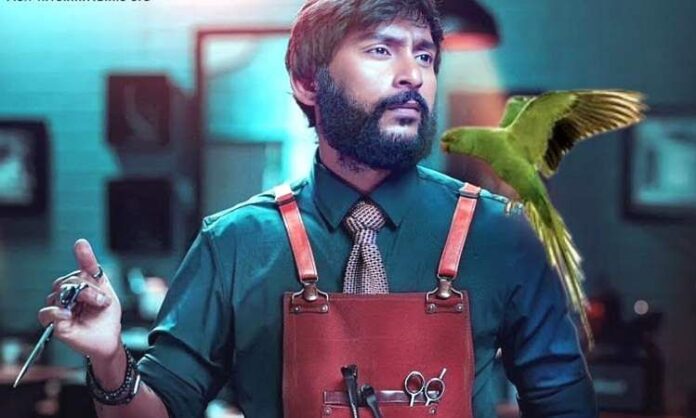I cannot talk enough about director Gokul’s natural talent for humour. We see so many filmmakers struggle to create one memorably funny moment in a whole film, and we can imagine how hard it must be to conceive and create laughter; but Gokul thrives in comedy—mostly of the absurd, over-the-top variety. Strange, extremely funny ideas in this film include a circumcised boy reacting to his relatives taking a peek at his genitalia, a man explaining the concept of ‘boy bestie’ with a plate of parotta and salna, and as with the director’s most popular film, Idharkuthaane Aasaipattai Balakumara, wine shop interactions that range from the banal to the bizarre. During these jokes, during these inspired portions, the film is most at ease.
Director: Gokul
Cast: Sathyaraj, RJ Balaji, John Vijay, Kishen Das
Sathyaraj is a total riot playing a stingy father-in-law, and Gokul happily milks his miserliness for comedy—like when someone remembers that he went alone on his honeymoon so he could save money, like when someone offers to buy him drinks and he diligently pours his drink back into the bottle. With a stunted smile and a balding head whose remaining hair is flying in all directions, he is so compelling that I wished that he were the protagonist of this film, and the story was simply a documentation of his shenanigans. Alas, the story, too like his hair, flies off in many unexpected directions.
And yet, before we discuss the ill-advised detours in content and tone, much credit to RJ Balaji for being a selfless protagonist, in more ways than one. Yes, within the universe of the film, he plays a bit of a softie who’s not above apologising or expressing gratitude. I particularly enjoyed that scene in which he regrets asking his father-in-law for help after realising that the latter’s hard-earned money isn’t for entitled new members of the family to use for themselves. (It’s also why I disliked the choice to have him take advantage of his father-in-law’s drunkenness—even if Gokul deftly sells it all as humour.) The selflessness is also in allowing multiple characters to flourish and making this world democratic in a way that reflects the eventual theme of the film—like when we see the impoverished and the downtrodden find sanctuary in his saloon. If RJ Balaji were a conventional protagonist, Sathyaraj might not have been allowed to express himself for as long. Robo Shankar and John Vijay might not have been allowed as much liberty to play to the gallery. Kishen Das might not have been allowed to exist through the film. And above all, all those dancers at the end wouldn’t be getting such extended sequences.
And yet, the issue with the film is the dramatic difference in tone after its interval. Where we processed this film as a comedy with a bit of sentiment thrown in, we are suddenly encouraged to deal with the film turning into a super-soppy affair. Sathyaraj, who is so charismatic before the interval, disappears for a long time, and when he does make brief appearances, his transformation isn’t easy to buy. The whole parrots idea—which feels rather strange and forced for the longest time—finds some eventual resolution, but it isn’t nearly as effective as the film seems to think, especially with the bad CG.
The absence of comedy is rather strange because Kathir’s story feels ripe for some twisted humour, given that the man can’t catch a break. Buildings crumble in front of him; thieves run off with his money; strangers infiltrate his saloon. Gokul could easily have milked all of this for laughs, but for whatever reason, he decides he’s done with the jokes. Even worse, the film begins to, in increasingly desperate ways, appeal to our tear ducts. There, look at the parrots die! Gonna cry now? No? How about when an umbilical cord is cut with saloon scissors? No? What about when slum people are being evicted? Surely, at least now? Wait, wait, these selfless slum-dwellers are now dancing but not for selfish reasons? Can you imagine? CRY NOW!
The problem isn’t that these ideas aren’t good. The film does mean well and stands for sensible causes, but after the hilarity of the first half, it just feels difficult and wholly unnecessary to settle for a passable second half that hurtles through familiar roads to get to expected destinations. Well-ended is half done when it comes to feature films, and Singapore Saloon doesn’t do this either. It has a stretched-out climax portion that drags on well beyond the finish line. Surprise appearances include bizarre cameos from Singapore politicians and even our very own Chief Minister—and by then, I had begun reminiscing funny bits from the first half. Like Y Gee Mahendra randomly calling up Sathyaraj and saying, “Dai, pommanaati ku porandha kamminaati!” It has absolutely no business being as funny as it does, but that’s the talent Gokul has. I only wish he had stopped channelling it at interval point.
#laughs #land #great #sentiment #Cinema #express

